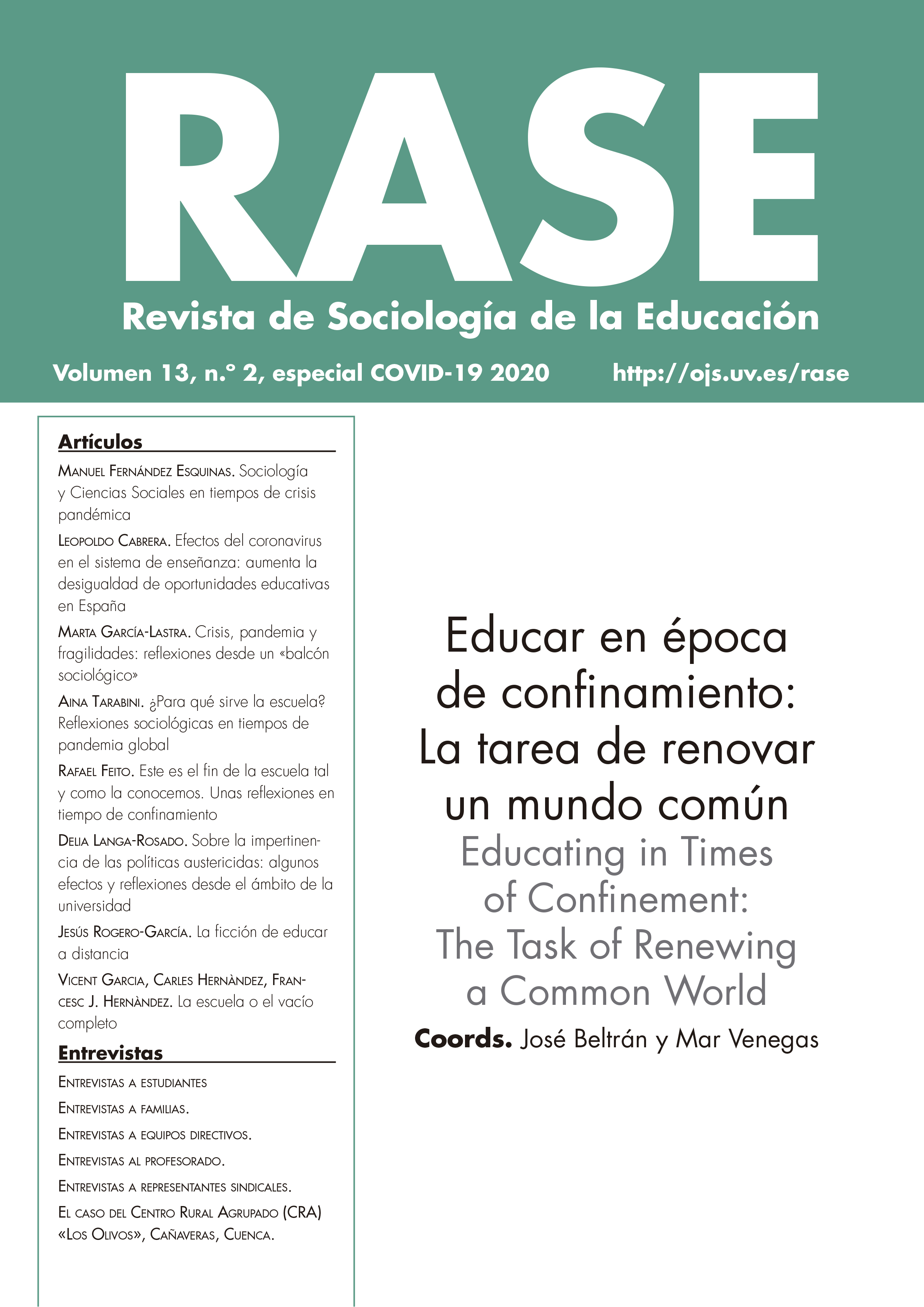What Are Schools For? Sociological Reflections in Times of Global Pandemic
DOI:
https://doi.org/10.7203/RASE.13.2.17135Keywords:
Sociology of education, social justice, purposes of schooling, learning, presence, teachers Abstract
Abstract
The global pandemic generated by COVID-19 and the consequent mandatory confinement measures of the population entail unpreceden- ted challenges for the education systems elsewhere. The closing of the schools and of the face-to-face classes highlights a critical question: What is the school for? The objective of the paper is to reflect on this question from a sociological perspective and, in particular, from an educational and social justice perspective. It is argued that the main function of the school as a specialized institution should be the transmission and acquisition of powerful, relevant and meaningful knowledge for all students. Likewise, two requirements are established to guarantee the exercise of this role: the physical presence as the basis for developing full interaction; and the role of teachers to simulta- neously ensure students’ learning and wellbeing. Overall, the paper provides a reflection not only on the impacts of the current situation on the functions of the school, but also on the meaning of the educational institution in the xxi century, representing a key contribution within the debates of the sociology of education.
 Downloads
Downloads
 References
References
Althusser, L. (1985). El aparato ideológico del estado escolar como aparato dominant. En Gras, A.(ed.) Sociología de la educación. Textos fundamentales. Madrid: Narcea.
Bernstein, B. (1985a). Clases sociales, lenguaje y socialización. Revista Colombiana de Educación. Vol. 5
Bernstein, B. (1985b). Clasificación y enmarcación del conocimiento educativo. Revista Colombiana de Educación. Vol. 15.
Bonal, X. y González, S. (2020). Confinamiento y efecto escuela. Artículo de prensa publicado en el Periódico día 06/04/2020. Acceso: https://www.elperiodico.com/es/opinion/20200406/efecto-coronavirus-desigualdad-escuelas-xavier-bonal-sheila-gonzalez-7919442
Bonal, X. (1998). Sociología de la Educación: una aproximación crítica a las corrientes contemporaneas. Barcelona: Paidós
Bourdieu, P. y Passeron, (1970). La Reproduction. Éléments pour une théorie du système d’enseignement. Paris: les editions de minuit
Bowles, S. y Gintis, H. (1976) Schooling in Capitalist America, London: Routledge and Kegan Paul.
Caledrón, D. (2020). Jóvenes y desigualdad digital: las brechas de acceso, competencias y uso. Madrid: Centro reina Sofía sobre adolescencia y juventud.
De Souza Santos; B. (2016). La incertidumbre: entre el miedo y la esperanza. En: De Souza Santos; B. La difícil democracia. Una mirada desde la periferia europea. Ediciones Akal.
Dubet, F. (2010). Crisis de transmisión y declivi de la institución. Política y Sociedad, 47(2), 15-25.
Gimeno sacristán, J. (2000). La educación obligatoria: su sentido educativo y social. Madrid: Morata.
Hargreaves, A. (2003). Teaching in the Knowledge Society. Education in the Age of Insecurity. New York and London: Teachers College Press.
Hargreaves, A. (2001). Emotional Geographies of Teaching. Teachers College Record, 103 (6), 1056–1080.
Lynch, K., y Baker, J. (2005). Equality in education An equality of condition perspective. Theory and Research in Education, 3(2), pp. 131–164
Lareau, A. (2003). Unequal Childhoods. Class, race and family life. Berkeley: University of California Press.
Lingard, B. y Keddie, A. (2013). Redistribution, recognition and representation: working against pedagogies of indifference. Pedagogy, Culture & Society, 21:3, 427-447
Martin Criado, E. (2000). El confinamiento aumenta la desigualdad educativa (y no es culpa de los padres). Publicado en Entramados sociales, web de divulgación sociológica día 01/04/2020. Acceso: https://entramadossociales.org/educacion/el-confinamiento-aumenta-la-desigualdad-educativa-y-no-es-culpa-de-los-padres/
Menéndez, P. (2020). Coronavirus y educación. Antes ya teníamos una crisis de la escuela. Entrevista publicada en Clarín el día 10/04/2020. Acceso: https://www.clarin.com/revista-enie/ideas/pepe-menendez-crisis-escuela_0_gegH7q4NW.html
Morin, E. (1999). Los siete saberes necesarios para la educación del futuro. París: UNESCO.
Parsons, T. (1990). El aula como sistema social: Algunas de sus funciones en la sociedad americana. Educación y Sociedad vol. (6).
Perrenoud, P. (2011). Desarrollar la Práctica Reflexiva en el Oficio de Enseñar. Barcelona: Graó.
Reay, D. (2010). Identity Making in Schools and Classrooms. En: M. Wetherell y Ch. Talpade Mohanty (Eds). The Sage Handbook of Identities. Londres. Sage.
Reay, D. (2004). Gendering Bourdieu’s concepts of capitals? Emotional capital, women and social class. The Sociological Review.
Tarabini, A. (2018). La escuela no es para ti. El rol de los centros educativos en el abandono escolar. Madrid: Octaedro.
Tarabini, A. Jacovkis, J, Montes A. (2017). Los factores de la exclusión educativa en España: Mecanismos, perfiles y espacios de intervención. UNICEF: Madrid
Tarabini, A., Curran, M., Montes, A., Parcerisa, LL (2015). La vinculación escolar como antídoto del abandono escolar prematuro. Explorando el papel del hábitus institucional. Profesorado. Revista de currículum y formación de profesorado, 19(3).
Youdell, D. (2006). Impossible bodies, impossible selves: Exclusions and student subjectivities. Dordrecht: Springer.
Young, M. (2013). Powerful knowledge: an analytically useful concept or just a ‘sexy sounding term’? A response to John Beck’s ‘Powerful knowledge, esoteric knowledge, curriculum knowledge’, Cambridge Journal of Education, 43:2, 195-198
Young, M. (2010). The future of education in a knowledge society: The radical case for a subject-based curriculum, Pacific-Asian Education, a Journal about Education in Pacific Circle countries, 22(1), 21-32
Young, M. (Ed) (1971). Knowledge and control: New directions for the sociology of education. London: Collier-Macmillan Publishers
Downloads
Published
How to Cite
-
Abstract34832
-
PDF (Español)20020
Issue
Section
License
![]()
This work is licensed under a Creative Commons Reconocimiento-NoComercial-CompartirIgual 4.0 Internacional.




